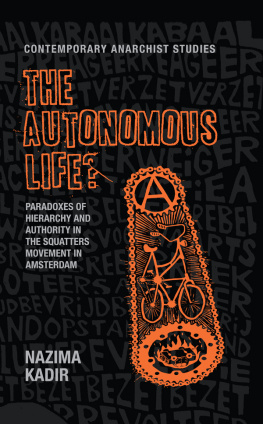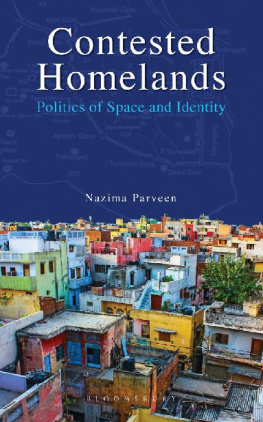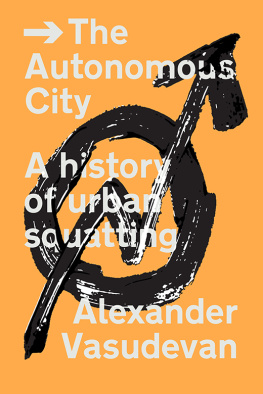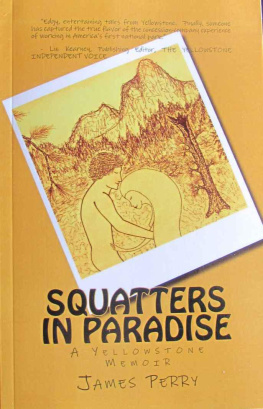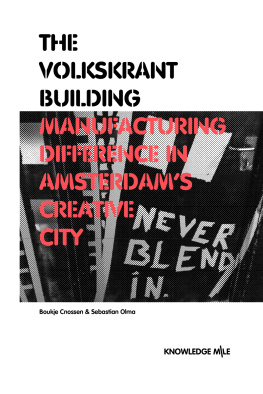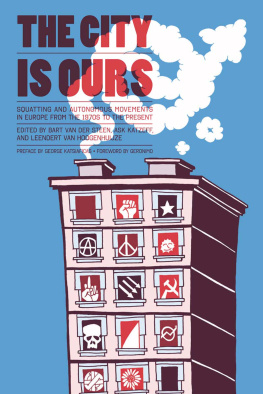Contemporary Anarchist Studies
A series edited by
Laurence Davis, University College Cork, Ireland
Uri Gordon, Loughborough University, UK
Nathan Jun, Midwestern State University, USA
Alex Prichard, Exeter University, UK
Contemporary Anarchist Studies promotes the study of anarchism as a framework for understanding and acting on the most pressing problems of our times. The series publishes cutting-edge, socially engaged scholarship from around the world bridging theory and practice, academic rigor and the insights of contemporary activism.
The topical scope of the series encompasses anarchist history and theory broadly construed; individual anarchist thinkers; anarchist informed analysis of current issues and institutions; and anarchist or anarchist-inspired movements and practices. Contributions informed by anti-capitalist, feminist, ecological, indigenous and non-Western or Global South anarchist perspectives are particularly welcome. So, too, are manuscripts that promise to illuminate the relationships between the personal and the political aspects of transformative social change, local and global problems, and anarchism and other movements and ideologies. Above all, we wish to publish books that will help activist scholars and scholar activists think about how to challenge and build real alternatives to existing structures of oppression and injustice.
International Editorial Advisory Board:
Martha Ackelsberg, Smith College
John Clark, Loyola University
Jesse Cohn, Purdue University
Ronald Creagh, Universit Paul Valry
Marianne Enckell, Centre International de Recherches sur lAnarchisme
Benjamin Franks, University of Glasgow
Judy Greenway, Independent Scholar
Ruth Kina, Loughborough University
Todd May, Clemson University
Salvo Vaccaro, Universit di Palermo
Lucian van der Walt, Rhodes University
Charles Weigl, AK Press
Other titles in the series
(From Bloomsbury Academic):
Anarchism and Political Modernity
Angelic Troublemakers
The Concealment of the State
Daoism and Anarchism
The Impossible Community
Lifestyle Politics and Radical Activism
Making Another World Possible
Philosophical Anarchism and Political Obligation
The autonomous life?
Paradoxes of hierarchy and authority in the squatters movement in Amsterdam
Nazima Kadir
Manchester University Press
Copyright Nazima Kadir 2016
The right of Nazima Kadir to be identified as the author of this work has been asserted by her in accordance with the Copyright, Designs and Patents Act 1988.
Published by Manchester University Press
Altrincham Street, Manchester M1 7JA
www.manchesteruniversitypress.co.uk
British Library Cataloguing-in-Publication Data
A catalogue record for this book is available from the British Library
An electronic version of this book is also available under a Creative Commons (CC-BY-NC-SA) license.
Library of Congress Cataloging-in-Publication Data applied for
ISBN 978 1784 99410 5 hardback
ISBN 978 1784 99411 2 paperback
ISBN 978 1784 99756 4 open access
First published 2016
The publisher has no responsibility for the persistence or accuracy of URLs for any external or third-party internet websites referred to in this book, and does not guarantee that any content on such websites is, or will remain, accurate or appropriate.
Typeset by Out of House Publishing
A few months before I left Amsterdam, I attended one of my last squatting actions. A former squatter housemate had organized the squatting of luxury condominiums. They had once been affordable social housing apartments, available for permanent rental to anyone whose number had come up after years on the waiting list. The squatters movement considered the practice of renovating and selling social housing apartments a betrayal to the Socialist ideals that led to the building of such housing a few decades earlier.
My friend was squatting these apartments because most had not sold, after nearly a year on the market following the global credit crisis. Mortgages were hard to come by and the apartments had become unexpectedly unaffordable. It was a confrontational action since squatters typically occupied abandoned spaces rather than luxury apartments. My friend felt unsure of how the police and the neighbors would react, so he organized hundreds of people to attend. The more support, the less likelihood of violence.
He planned well. By the time I arrived, the squatters had broken open the apartment doors and moved in, and the police had inspected the spaces and left. Hundreds of black clad punks in attendance milled around chatting in the newly squatted apartments, on the street, and on the sidewalks. It was a festive atmosphere.
However, a white Dutch couple in their late fifties who had purchased one of the condominiums was unhappy. They were now sandwiched in between squatters in the apartments above, below, and in the buildings on either side. I watched the husband lean out his window, stare craggily at the sea of white punks who had taken over the street, and say, repeatedly: Fucking Muslims. Fucking Muslims.
This book is full of strange and contradictory stories like this one. I focus on micro-social interactions that reflect larger tensions around power, authority, belonging, and identity in the squatters movement specifically, and in urban life generally. These stories emerged from observations, interactions, and interviews during three-and-a-half years of anthropological research in a squatters community in Amsterdam. During this time, I resided in four squats where I was a member of living groups. I regularly attended squatting actions, political actions, worked as a cook in a squatted restaurant, worked on anti-gentrification campaigns and house defenses, and generally hung out in the citywide squatters scene. I was evicted twice and jailed once.

In addition to narrating stories, I systematically examine what people say versus what they do, and what these contradictions mean. Why did the older Dutch man curse Muslims when no Muslims were visually present nor responsible for the squatting? What does this incident reveal about an environment where it is acceptable to articulate xenophobic statements when feeling angry, powerless, and surrounded?
Since this book is about the squatters movement in Amsterdam, I focus on taboo dynamics that have yet to be examined in social movement literature. How do people silently practice hierarchy and authority in an anarchist community that rejects hierarchy and authority? How does that paradox structure every aspect of social life in this movement?
My tone and perspective differ radically from social movement literature, which often represents activists romantically. In contrast, my observations of this subculture are influenced by women/gender studies, queer theory, and subaltern studies. Hence, I view people in this movement as people, rather than heroes. Activists tend to consider their spaces and practices as, heterotopias, that is, existing outside of hegemonic norms. I have found otherwise. I have witnessed activists unwittingly reproducing and being embedded in the very social and cultural norms that they verbally reject. Such contradictory practices are universal rather than hypocritical because people all of us are flawed and complicated. This is also what makes life interesting.

